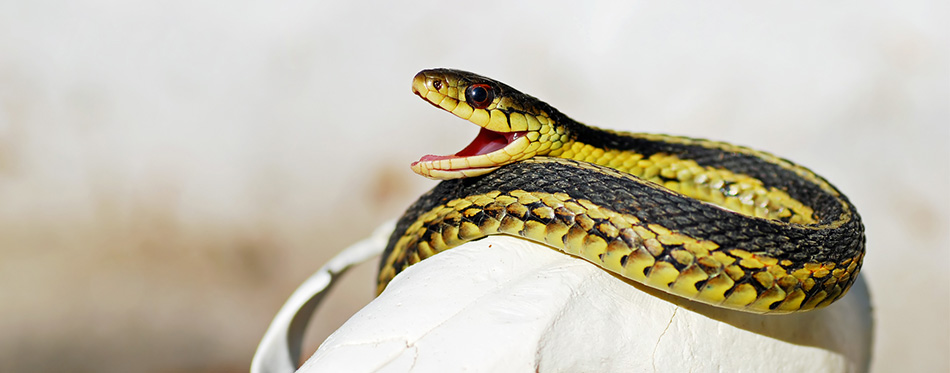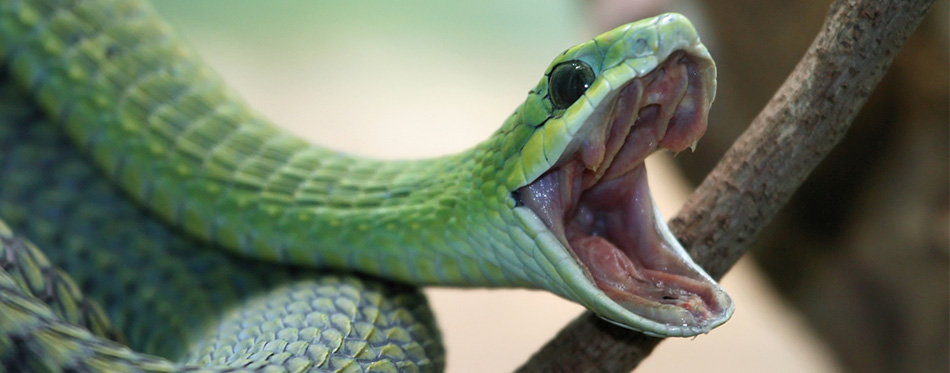For something as dangerous as a snake, you wouldn’t think that they do what other animals do. It might have never crossed your mind that a snake yawns, too. People would think that with the reputation of the snake, it seems out of character for them to even the normal things most animals do. But unlike most animals who yawn because they’re sleepy, snakes yawn for an entirely different reason. Read on to know why.

Why Your Snake Yawns
So if it isn’t due to lack of sleep, then why does your snake yawn? There are several (yes, several) reasons why.
- They realign their jaws for a big meal.
Ever wondered how a tiny snake’s mouth can devour a huge animal? The answer lies in their jaw. Unlike the usual animal’s jaws, a snake’s can actually be rearranged so that they can eat an animal whole. A snake’s lower jaw is not attached to a bone, but instead, it is attached to ligaments which make it easier for them to move it forward and back.
A snake usually yawns if they are preparing to eat an animal larger than its head. This is when the jaws unhinge themselves from their normal state. There are also times when a snake yawns after they eat a huge meal. This is when the jaws help swallow the animal and push it towards their belly.
- They get cues from the environment
Aside from the super sensitive senses of snakes, there is another way for them to pick up on some cues in their surroundings. You’ve guessed it – it’s through their mouth. By yawning, their tongue is exposed to the surroundings giving the snake an idea of what is in its vicinity.
If you observe snakes closely, there are times when they don’t yawn. Instead, they hiss and put their tongue out and quickly draw it in again. This is when they pick up cues from the environment. However, there are times when their tongue does not get enough cues, so the snake yawns. According to scientists, yawning exposes their Jacobson’s Organ (also known as vomeronasal organ) which is an organ that helps interpret signals from the environment.
The Jacobson’s Organ is one of the most unique organs found in snakes. It functions like the nose since it focuses on the sense of smell. But unlike the nose, this specialized organ smells chemicals around which help snakes identify whether they have prey around or they are being preyed upon.
- They could have a disease
Lastly, even if it seems natural for snakes to yawn or open their mouth, there are times when this is no longer normal. In some cases, frequent mouth gaping is a sign that the snake has received an infection. This is usually a result of them consuming different kinds of animals.
For example, if the mouse that the snake ate has infection or bacteria, then the snake gets infected, too. Bacteria can eat away at their tissues making the snake ill. If you have a pet snake that is yawning excessively, you can interpret this as a symptom of an illness.
Do Snakes Yawn When They Are Tired?
While exhaustion is not one of the reasons listed above, some people still wonder if snakes ever yawn at all because of exhaustion.
A study published in Physiology & Behavior showed that humans yawn because of the difference in temperature. For example, people tend to yawn more during the summer months because yawning allows the body to cool down. This happens when the lungs take in cool air.
Using this statement, one can theorize that snakes can also yawn to supply cool air to their body. After all, snakes can also feel very warm even if they are cold-blooded animals. Nonetheless, there is no scientific proof showing that snakes ever yawn because they are tired.
More on Snakes Yawning
One of the reasons why snakes yawn is because of a disease. Apart from getting bacteria from the food they eat, snakes can also get sick whenever they open their mouths and get exposed.
There are cases when snakes get respiratory disease. Naturally, this will give them a hard time breathing through their nostrils. This is why they yawn instead so they can get air to fill their lungs. However, there are times when snakes get pneumonia. Pneumonia is a lung illness wherein the air sacs fill with infection making it hard for anyone or anything to breathe.
To know if your pet snake has pneumonia, the common symptom is them yawning constantly. Since they will have a hard time breathing as well, constant yawning will help stabilize the difficulty of breathing through their nostrils. Other symptoms include having nasal discharge (yes, even snakes can get colds too) and bubbles around their mouth.
But apart from bacteria or virus, your pet snake can get respiratory problems from the ambient temperature. It can be to humid or it can be too warm which can give them a hard time breathing.

Inclusion Body Disease
It is important to note that there is another disease that shows the symptoms of yawning. This is called Inclusion Body Disease (IBD). This disease refers to a new body infection found to be contagious among snakes. It is likened to how flu is to humans.
IBD can cause a snake to avoid eating, mouth gape, and stargaze. The term “stargaze” refers to snakes looking up at an unnatural angle. Usually, they curl themselves and leave their head staring upwards. If you aren’t aware, this is already an unnatural behavior for these reptiles.
IBD mostly affects boa constrictors. However, it is still unclear as to how they are spread from one snake to another. The theory is that this disease gets passed on during the birth of the snake while there is also a high chance that they can get this through contact with other infected snakes.
As of now, there is no known cure for inclusion body disease. Although you can always get it inspected by experts on snakes to see how the symptoms can be cured.

